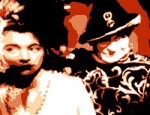Film Review

The supporting cast is nearly as impressive, featuring some of the biggest names in French cinema (Claude Brasseur, Jean-Louis Trintingant, Marie-France Pisier, Jean Carmet) - including some fledgling young actors who have yet to make it big (Daniel Auteuil and Thierry Lhermitte). It is a dream cast that works remarkably well, Trintingant's soliloquising rival banker being particularly memorable.
Even by French standards, the production values of this film are impressive. With great attention to period detail, the film offers a convincing portrait of the 1920s, capturing the mood and ethics of the period very well.
Whilst this is an exceptionally well made film, it is not without its faults. The constant switching between colour and black-and-white is at first amusing but soon becomes irritating. Its only justification seems to be to allow the inclusion of Pathé newsreel footage (most of which is totally unnecessary). Also some of the quirky comic touches in the first part of the film seem excessive. Perhaps the film's biggest deficiency is that it just looks too glossy, too lavish. You feel that more attention could have been paid to developing characterisation more fully. In spite of this, La Banquière manages to be both an entertaining and reasonably satisfying piece of cinema.
© James Travers 2002
The above content is owned by frenchfilms.org and must not be copied.
Film Synopsis
Towards the end of the 1920s, Emma Eckhert has become one of the most talked about women in France. Not only is she stunningly beautiful and a staunch supporter of moral campaigns, she is also a hugely successful banker. Having made a fortune speculating on the stock exchange, she intends to share her wealth with her investors, offering them a far higher rate of interest than her competitors. Needless to say, the traditional bankers regard her as a dangerous threat and conspire to bring about her downfall...© James Travers
The above content is owned by frenchfilms.org and must not be copied.
Similar Films
Here are some other films you may enjoy watching:- Nayak (1966)
- Madame X (1966)
- Othello [TV] (1981)
- Jean de Florette (1986)
- Le Diable probablement (1977)
Other related links:
Film Credits
- Director: Francis Girod
- Script: Georges Conchon, Francis Girod
- Cinematographer: Bernard Zitzermann
- Music: Ennio Morricone
- Cast: Romy Schneider (Emma Eckhert), Marie-France Pisier (Colette Lecoudray), Claude Brasseur (Largué), Jean-Claude Brialy (Paul Cisterne), Jean Carmet (Duvernet), Jean-Louis Trintignant (Horace Vannister), Jacques Fabbri (Moïse Nathanson), Daniel Mesguich (Rémy Lecoudray), Noëlle Chatelet (Camille Sowcroft), Daniel Auteuil (Duclaux), Thierry Lhermitte (Devoluy), Alan Adair (Sir Charles), François-Régis Bastide (Le ministre de la Justice), Arnaud Boisseau (Armand), Yves Brainville (Prefaille), Philippe Brizard (Chériaux), Francis Claude (Le président du tribunal), Philippe Collin (Savatier), Georges Conchon (Bréhaud), Claude Darget (Bourseul Martilly)
- Country: France
- Language: French
- Support: Color
- Runtime: 125 min
- Aka: The Lady Banker ; The Woman Banker
The best of Japanese cinema

French cinema during the Nazi Occupation

Kafka's tortuous trial of love
